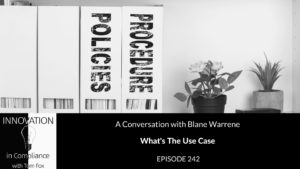
Blane Warrene is the Vice President of Product Management at Smarsh, an organization that helps companies manage risk in their electronic communications. Tom Fox welcomes him to this week’s show to talk about a variety of topics surrounding compliance around mobile and hybrid work environments.
Compliance Challenges in The Hybrid Work Environment
There are three key factors that are compliance challenges in the hybrid work environment: the risk that comes with using company devices, bringing your own devices to handle company data, and consumer applications. Blane stresses that implementing policy is vital because policy is the frame in which the organization operates. However, Blane also remarks that a layer of processing technology has to be embedded within policy in order to completely tackle the issues that cause compliance challenges.
Finding The Right Balance
Many companies and clients struggle with finding the right balance among apps, smartphones and global work tools. The key to achieving this balance is to first find out what the client or customer wants to enable. “The right first question is what problem are you trying to either solve, or what do you need to enable for your business,” Blane tells Tom. Take compliance out of the equation and simply focus on what the customer wants to achieve with their company. When you approach it that way, you often get a clearer answer that leads to the use case.
Capturing Communication
Tom asks Blane what Smarsh recommends to capture or archive communications such as email or text. Blane explains that social media communication is what you want to plan for because each of the sources that you go to, has a different way to get the data. Smarsh makes it easier for someone who wants to capture a wide set of data. “What we do recommend is that it comes in on a regular frequency such as real time or daily, and they certainly have the ability with retention rules to not keep everything forever which is not productive,” Blane says. Certain pieces of data can only be kept for a finite period of time, but doing this ensures that the client doesn’t have a blind spot on the things they know they’re using.
What Tools Should You Allow
Companies sometimes determine what tools they should allow based on where they are in the world. The tools are also based on what they as companies are trying to solve, how they communicate and what models they support. “That discussion helps us, basically enable us, to say to them ‘Here is the way you solve these use cases and ultimately you want them in a single pane of glass’,” Blane expresses. He adds that from a compliance perspective, you want to know that you can retain that data even if you get it in different ways. Data should be able to be viewed in a common context and not across separate silos.
Resources
Blane Warrene | Twitter
Smarsh





